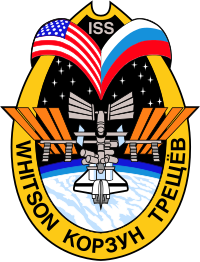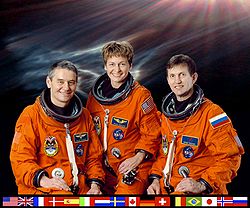Expedition 5
| Expedition 5 | |||
 | |||
| Uppdragsstatistik | |||
|---|---|---|---|
| Rymdstation: | ISS | ||
| Start: | 7 juni 2002, 16:25 UTC[1] | ||
| Slut: | 2 december 2002, 20:05 UTC[1] | ||
| Antal besättningsmedlemmar: | 3 | ||
| Rymdpromenad | |||
| Antal rymdpromenader: | 2 st | ||
| Total tid: | 9 tim 46 min | ||
| Transport | |||
| Uppskjutning: | 5 juni 2002 21:22:49 UTC med STS-111 Endeavour | ||
| Uppskjutningsplats: | Kennedy Space Center[1] | ||
| Landning: | 7 december 2002, 19:38:25 UTC med STS-113 Endeavour | ||
| Landningsplats: | Kennedy Space Center[1] | ||
| Kronologi | |||
| |||

Expedition 5 var den 5:e expeditionen till Internationella rymdstationen (ISS). Expeditionen började den 7 juni 2002 med att rymdfärjan Endeavour under flygningen STS-111 återvände till jorden med Expedition 4:s besättning. Expedition avslutades den 7 december 2002 då rymdfärjan Endeavour under flygningen STS-113 återvände till jorden med Expedition 5:s besättning.
Utbyggnad av stationen
Under Expedition 5 levererade och installerades Truss P1 av rymdfärjan Endeavour under flygningen STS-113.
Besättning
| Position | (5 juni - 7 december 2002) |
|---|---|
| Befälhavare | Hans andra rymdfärd |
| Flygingenjör 1 | Hennes första rymdfärd |
| Flygingenjör 2 | Hans första rymdfärd |
Referenser
- ^ [a b c d] NASA's Space Station Expedition 5 Arkiverad 16 augusti 2019 hämtat från the Wayback Machine., läst 28 augusti 2016.
Externa länkar
| |||||||||||||||||||
Media som används på denna webbplats
The International Space Station (ISS) Expedition Five patch depicts the Station in its completed configuration and represents the vision of mankind's first step as a permanent human presence in space. The United States and Russian flags are joined together in a Roman numeral V to represent both the nationalities of the crew and the fifth crew to live aboard the ISS. Crew members’ names are shown in the border of this patch. This increment encompasses a new phase in growth for the Station, with three Shuttle crews delivering critical components and building blocks to the ISS. To signify the participation of each crew member, the Shuttle is docked to the Station beneath a constellation of 17 stars symbolizing all those visiting and living aboard Station during this increment.
The International Space Station (ISS) Expedition Four crew patch has an overall diamond shape, showing the "diamond in the rough" configuration of the Station during expedition four. The red hexagonal shape with stylized American and Russian flags represents the cross-sectional view of the S0 truss segment, which the crew will attach to the U.S. Lab Destiny. The persistent Sun shining on the Earth and Station represents the constant challenges that the crew and ground support team will face every day while operating the International Space Station, while shedding new light through daily research. The green portion of the Earth represents the fourth color in the visible spectrum and the black void of space represents humankind's constant quest to explore the unknown.
The International Space Station (ISS) Expedition 6 crew patch depicts the station orbiting the Earth on its mission of international cooperation and scientific research. The Earth is placed in the center of the patch to emphasize that work conducted aboard this orbiting laboratory is intended to improve life on our home planet. The shape of the Space Station’s orbit symbolizes the role that experience gained from ISS will have on future exploration of our solar system and beyond. The American and Russian flags encircling the Earth represent the native countries of the Expedition 6 crew members, which are just two of the many participant countries contributing to the ISS and committed to the peaceful exploration of space.





